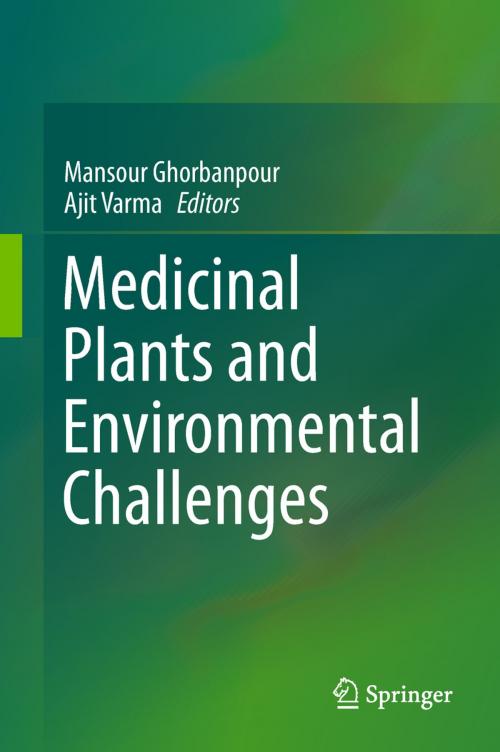Medicinal Plants and Environmental Challenges
Nonfiction, Health & Well Being, Medical, Medical Science, Pharmacology, Science & Nature, Science, Biological Sciences, Botany| Author: | ISBN: | 9783319687179 | |
| Publisher: | Springer International Publishing | Publication: | October 31, 2017 |
| Imprint: | Springer | Language: | English |
| Author: | |
| ISBN: | 9783319687179 |
| Publisher: | Springer International Publishing |
| Publication: | October 31, 2017 |
| Imprint: | Springer |
| Language: | English |
This book sheds new light on the role of various environmental factors in regulating the metabolic adaptation of medicinal and aromatic plants. Many of the chapters present cutting-edge findings on the contamination of medicinal plants through horizontal transfer, as well as nanomaterials and the biosynthesis of pharmacologically active compounds. In addition, the book highlights the impacts of environmental factors (e.g., high and low temperature, climate change, global warming, UV irradiation, intense sunlight and shade, ozone, carbon dioxide, drought, salinity, nutrient deficiency, agrochemicals, waste, heavy metals, nanomaterials, weeds, pests and pathogen infections) on medicinal and aromatic plants, emphasizing secondary metabolisms.
In recent years, interest has grown in the use of bioactive compounds from natural sources. Medicinal and aromatic plants constitute an important part of the natural environment and agro-ecosystems, and contain a wealth of chemical compounds known as secondary metabolites and including alkaloids, glycosides, essential oils and other miscellaneous active substances. These metabolites help plants cope with environmental and/or external stimuli in a rapid, reversible and ecologically meaningful manner. Additionally, environmental factors play a crucial role in regulating the metabolic yield of these biologically active molecules. Understanding how medicinal plants respond to environmental perturbations and climate change could open new frontiers in plant production and in agriculture, where successive innovation is urgently needed due to the looming challenges in connection with global food security and climate change. Readers will discover a range of revealing perspectives and the latest research on this vital topic.
This book sheds new light on the role of various environmental factors in regulating the metabolic adaptation of medicinal and aromatic plants. Many of the chapters present cutting-edge findings on the contamination of medicinal plants through horizontal transfer, as well as nanomaterials and the biosynthesis of pharmacologically active compounds. In addition, the book highlights the impacts of environmental factors (e.g., high and low temperature, climate change, global warming, UV irradiation, intense sunlight and shade, ozone, carbon dioxide, drought, salinity, nutrient deficiency, agrochemicals, waste, heavy metals, nanomaterials, weeds, pests and pathogen infections) on medicinal and aromatic plants, emphasizing secondary metabolisms.
In recent years, interest has grown in the use of bioactive compounds from natural sources. Medicinal and aromatic plants constitute an important part of the natural environment and agro-ecosystems, and contain a wealth of chemical compounds known as secondary metabolites and including alkaloids, glycosides, essential oils and other miscellaneous active substances. These metabolites help plants cope with environmental and/or external stimuli in a rapid, reversible and ecologically meaningful manner. Additionally, environmental factors play a crucial role in regulating the metabolic yield of these biologically active molecules. Understanding how medicinal plants respond to environmental perturbations and climate change could open new frontiers in plant production and in agriculture, where successive innovation is urgently needed due to the looming challenges in connection with global food security and climate change. Readers will discover a range of revealing perspectives and the latest research on this vital topic.















